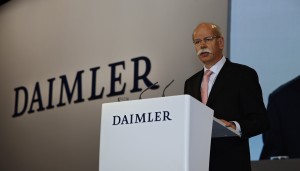
Cost cutting and efficiency programs in all divisions are the order of Daimler's days.
“We intend to remain a strong company also in times of weak markets,” said Daimler chief executive Dieter Zetsche. He emphasized at its annual meeting that the company has embarked an extensive effort to reduce costs in every part of the company.
However, Zetsche also told shareholders in Berlin that Daimler now expects what he described as a “significant” loss during the first quarter. The first quarter loss follows a loss of $2 billion during the fourth quarter of 2008.
“Nobody in our sector will go unscathed by an economic crisis, the likes of which might occur once in a century,” Zetsche said. “We will do whatever needs to be done. We will not let our company be put at risk,” he said.
Cost cutting and efficiency programs in all divisions are the order of the day, added Zetsche, who has introduced a new level of austerity to a company long noted for its free-spending culture.
The rigid cost management, reduced labor hours and cuts in working capital are part of the company’s survival plan for 2009. Daimler has “drastically” intensified the actions introduced last autumn to reduce the costs, Zetsche said. Travel, consulting fees and corporate overhead have all been reduced, he said.
Wage increases have been limited to the portion specified by the collective bargaining agreement, while executives have had to accept substantial salary reductions of nearly 30%. Before the meeting, groups of youthful employees handed out leaflets protesting a decision to eliminate more than 20% of apprenticeships by the summer.
Some 68,000 Daimler employees are already working short work weeks.
In addition, Daimler disclosed last week that it was asking for $2.6 .billion in additional concessions from unionized blue and white-collar workers. The cuts include deferring a scheduled pay increase from May to December. Other moves include deferring $2,300 profit-sharing bonus that the company was scheduled to pay out at the end of April. As recently as February, Daimler had said that it intended to make the payment at the end of April. However, it is now asking the employees to defer the bonus until the company’s cash position improves, officials said.
Cash, in fact, has become an issue at Daimler, the company’s executives acknowledged.
Daimler “net liquidity” dropped from $12.9 billion at the end of 2007 to $3.1 billion, according to the company’s financial statement. The company also has another $56 billion in debt on its books and $15 billion in unfunded pension liabilities.
Despite the crisis, Daimler continues to make targeted investments in key technologies. Zetsche said “Although the crisis is forcing us to cut costs wherever we can, we will not jeopardize our future by reducing essential investment.” However, Zetsche told shareholders some product programs have been shelved in the face of the deep recession.
By 2012, Daimler also intends to reduce the average CO2 emissions of its new car fleet in Europe to the EU targets. Two-dozen Mercedes-Benz Cars models already emit less than 140 grams of CO2 per kilometer, and nearly every third car is meanwhile in the so-called “five-liter category” and at least 50% of all cars Mercedes-Benz will sell in Germany in 2009 will profit from the country’s new system of vehicle taxation.
“Even without the recession, it would be a huge undertaking to reinvent the automobile for the post-oil era. Now, however, we are faced with an economic earthquake right in the middle of a far reaching technological transformation. Not every company will be in the position to master this challenge. But Daimler will,” he said.
